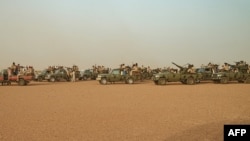The U.N. report said at least 87 people, including ethnic Masalits were buried in the mass grave credited to the RSF.
Ongoing fighting between the RSF and their rival, the Sudanese Armed Forces (SAF), has in recent weeks sparked ethnically motivated bloodshed, bringing the country to the brink of civil war.
In El Geneina, witnesses and rights groups report waves of attacks between the RSF and Arab militias against the non- Arab Masalit people, including shootings at close range.
Local people were forced to dispose of the bodies including those of women and children in an open area near the city between June 20-21, the U.N. statement said.
Some of the people had died from untreated injuries, added the statement.
Volker Turn, the U.N. High Commissioner for Human Rights, in the same statement condemned the killings while calling for a prompt and thorough investigation.
"I condemn in the strongest terms the killing of civilians and hors de combat individuals, and I am further appalled by the callous and disrespectful way the dead, along with their families and communities, were treated," Turk said.
Despite crediting the RSF for the mass grave, a U.N. spokesperson said it was not possible to determine exactly what portion of the dead were Masalits.
An RSF spokesperson was not immediately available for comment.
The ethnic killings have raised fears of a repeat of the atrocities perpetuated in Darfur after 2003, when "Janjaweed" militias from which the RSF was formed helped the government crush a rebellion by mainly non-Arab groups in Darfur, killing some 300,000 people.
Army spokesperson Brigadier General Nabil Abdullah told Reuters the incident "rises to the level of war crimes and these kinds of crimes should not pass without accountability."
"This rebel militia is not against the army but against the Sudanese citizen, and it is a racist project and a project of ethnic cleansing," Abdullah said.

Forum